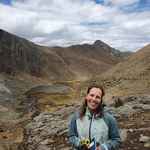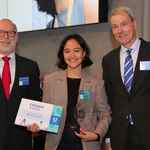Career Prospects
Our UvA Earth Sciences alumnus work as:
- Advisor on Circular Economy at Systemiq
- Startup in circular nutrients and consultancy
- Water quality and ecohydrology advisor at TAUW bv
- Sustainability consultant at Mérieux NutriSciences | Blonk
- Data trainee at the Province of North Holland
- GIS consultant GEODAN
- Professor Geology University of New York
- Centraal Bureau Statistiek Advisor
- PhD researcher nitrogen at the University of Amsterdam

I focus on crisis management, preparing for scenarios such as heavy rainfall, water pollution, and potential electricity outages. My background in Earth Sciences is invaluable.Paulien Deken, Trainee at Hoogheemraadschap Hollands Noorderkwartier Read more about Paulien's story

The highlight for me was getting to know my classmates. Even though the research was hard work, we had a blast exploring the island together.Itxaso Garay Morrissey, alumnus Read more about Itxaso's story
All former students of the Faculty of Science are alumni. Where do our alumnus end up after graduating? And how do they put their academic knowledge into practice? Marleen shares more about her career path.
Meet our students
Would you like to hear from one of our Master's students what it's really like to study at the UvA? Are you curious about the study programmes, student facilities, lecturers and research projects? You can either ask your questions by email, or make an appointment for a 'Meet the Master' day.

Compared to Earth Sciences programmes at other universities, the UvA offers more opportunities for applied research that connects directly to societal issues.Stijn de Boer, Graduate Earth Sciences Read more about Stijn's story

I was able to do a lot of fieldwork abroad, take courses in GIS, and further develop my laboratory skills.Demi Coenraads, Graduate Earth Sciences Read more about Demi's story